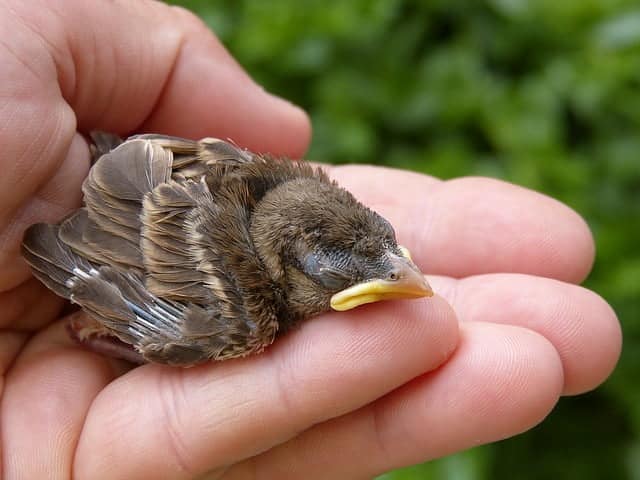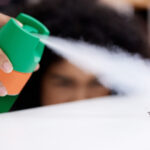Most likely, you have ever come across one of these small birds, it is a bird from North Africa and Eurasia, which measures only about 15 cm, while its plumage usually has brown tones. You can find these birds in different towns and even cities, since they are birds that usually live quite close to places inhabited by humans and it is for this reason that sometimes it is possible to find a hatchling that fell from its nest by accident. Do you want to know how to take care of a baby sparrow? Check out this post.
If you have found a baby sparrow and want to take it home, you should keep in mind that although these birds do not require special or complicated care, there are some steps you must follow to guarantee the survival of the baby, at least until it can fend for it. Itself.

What do you need to take care of a baby sparrow?
- Before picking up the baby sparrow to take it home, it is best to stay away for a few minutes, because it is possible that the parents of the little bird will return to take it back to the nest.
- So, the first thing you should do is take the bird to a veterinarian, in this way, you will make sure that the baby does not have any type of injury that puts its life at risk. In addition, the veterinarian could tell you more specifically what you should do to take good care of the sparrow.
- Besides, you need some things such as a small box that serves as a temporary bed for the bird, a place that keeps it warm, since in this way, the bird can develop without problems, food and water, and a syringe or a dropper with which you can easily feed and hydrate the sparrow, keep in mind that the syringe to be used is without a needle.
Instructions for caring for a baby sparrow
Here we show you step by step what you should do when caring for a baby sparrow:
- Take it to the vet
as we mentioned in the previous part, one of the first steps to take before taking the baby sparrow home is to take it to a vet. For this, you must take the little bird very carefully, since the young are usually very fragile and also, remember that it may be injured, you can wrap it with a cloth to keep it warm. This step is very important, because this way, the veterinarian will be able to tell you if the bird needs additional care or if it is in perfect condition. - Build a bed
being a fairly small bird, you want to make sure you find a place that is comfortable and warm enough for the sparrow to rest. For this, you need to build a bed using materials that you normally have at home. To begin with, you can use a small wooden box or other resistant material and then fill it with pieces of cotton cloth or some other fabric that is soft and above all, that helps maintain heat, which is essential for good growth. Of a baby sparrow. Another option is to make a nest with coconut fiber or a little hair, once you have it ready, place the cotton fabric inside so that the nest maintains a good temperature for the bird. - The cage
you can also use a small cage, as long as it is very well conditioned. This option has several advantages, the most important being that you can protect the sparrow from other pets you have at home, such as a cat. Also, you will prevent the bird from escaping from the nest or the box. Although, this option is more recommended when the sparrow is already recovered and therefore tries to fly. For newborn pups, a box or nest that is always kept warm is usually more than enough. - Hydration
Remember that the hatchling may have spent quite a bit of time on the ground since it fell from the nest, so it could be dehydrated. To hydrate it, it’s time to use the syringe or dropper. This step can be a bit complicated at first, so you must arm yourself with patience. You must bring the syringe close to the bird’s beak and release a small drop so that the sparrow knows that it is water, if you do not get any reaction from the bird, what you must do is open its beak a little, you must be the most careful as you can so as not to hurt him, and put pressure on the syringe little by little. The use of milk for the hydration of the little sparrow is not recommended for any reason, this is because these birds cannot tolerate it, and in fact they could die when ingesting it. - Feeding
Feeding plays a very important role in raising a small rescued sparrow, so you should pay close attention, since much of its survival depends on this step. As in the previous step, to feed the sparrow we will use a syringe. This should be done during the first few days, and keep in mind that a baby sparrow usually eats every two or three hours, you should also make sure to feel its crop to know if it is full or empty. To feed the sparrow, it is best to do it with a kind of porridge that you must use a little dog or cat feed mixed with water, another option is to buy special food directly from a bird store for pups, as they contain everything necessary to guarantee the good nutrition of the little pup. When feeding the little sparrow, you should make sure not to stain its feathers to prevent them from sticking to its body after drying, as it is a bit difficult to clean them. In addition, avoid obstructing the nostrils that are near the bird’s beak when you are feeding it.
If you carry out each of these steps carefully, rest assured that the little bird will be able to survive without problems and when the time comes you can release it.
Tips for caring for a baby sparrow
- The hatchling requires a specific temperature to survive, in this case it is best to ensure that the temperature of the nest or cage remains between 40 and 43 degrees.
- Make sure to always keep the baby clean and above all warm before and after feeding it.
- If you find a baby on the ground and you notice that there are a couple of birds flying over the place, it is best not to approach or touch the baby with your bare hands, since it may be the parents of the little sparrow trying to return it to the nest.
- Avoid feeding the sparrow solid food, as this could cause it to choke to death. Remember that you must make a paste and give it to him through a syringe.
- Never give a sparrow milk to drink, their body cannot tolerate it and they could die from ingesting it.
- Keep the baby out of the reach of small children and pets.
- If you notice that something strange is happening with the sparrow, it is best to take it urgently to the vet.















